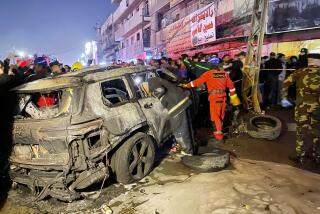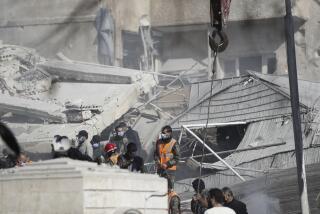Lebanon Druze leader Walid Jumblatt sides with Hezbollah in crisis
The U.S.-backed parliamentary coalition led by caretaker Prime Minister Saad Hariri was on the verge of losing its tenuous grip on the Lebanese government after a key politician defected Friday to support the Shiite militant group Hezbollah.
The decision by Walid Jumblatt, a Druze chieftain and longtime player amid Lebanon’s fractious parties, to back Hezbollah, which is supported by Syria, highlighted the dangerous regional maneuverings across the troubled Lebanese political scene. The move was a blow to Washington, which had worked with Hariri until his 14-month-old unity government collapsed this month.
“The party will stand firm in support of Syria and the resistance,” Jumblatt, head of the Progressive Socialist Party, said at a news conference in Beirut. He did not, however, reveal how many of the 11 members of parliament with his party would side with him. But Jumblatt’s support is crucial for any party jockeying to form a government.
Lebanon’s delicate unity government imploded after Hezbollah and its allies recently resigned from the Cabinet as a protest against the United Nations tribunal investigating the 2005 assassination of Hariri’s father, former Prime Minister Rafik Hariri. The probe is widely expected to result in indictments against Hezbollah members.
Tensions around the assassination investigation intensified when indictments were given to a judge in The Hague on Monday. Jumblatt, once a staunch supporter of the tribunal, attacked it as a threat to Lebanon’s security.
The Druze leader holds the decisive vote in parliament. If he sides with the Hezbollah-led coalition and manages to get the backing of at least seven of his 11 deputies, it would clear the way for the Shiite Muslim bloc and its allies to impose their choice as prime minister.
For his part, Saad Hariri has said he will attempt to regain his post when talks to form a new government begin Monday. “I remain committed as a candidate, in line with my parliamentary bloc’s decision,” Lebanese news reports quoted him as saying in a speech Thursday night.
The standoff, one of Lebanon’s worst crises in years, comes as Turkey, Qatar and Saudi Arabia appear to have abandoned mediation efforts. The escalating confrontation between the Hezbollah-led coalition and Hariri’s reflects the ongoing geopolitical rivalry between a camp of nations and militant groups led by Shiite Iran and another supported by the U.S. and its Sunni Muslim allies, most notably Saudi Arabia.
Analysts said Syria has put immense pressure on Jumblatt to support the opposition. They added that such a scenario was no surprise given that Jumblatt, as head of a minority group, would be prone to side with Hezbollah in hopes of warding off another round of sectarian violence among Shiites, Sunnis and Christians.
But analysts were skeptical of a Cabinet led by the Hezbollah-controlled opposition. Such a Cabinet, they said, would probably not win the approval of President Michel Suleiman and would be boycotted by Hariri’s current pro-Western parliamentary majority, known as the March 14 alliance.
“We will not have a new Cabinet … for months and months,” said Hilal Khashan, a political scientist at the American University of Beirut.
To form a government, one must have the support of at least 65 lawmakers in Lebanon’s 128-seat parliament. Hezbollah and its allies have 57 seats and Hariri’s coalition has 60.
Concerns about sectarian violence increased this week when dozens of black-clad, unarmed Hezbollah supporters reportedly grouped in various West Beirut neighborhoods Tuesday morning, prompting schools to close and the army to bolster its presence.
Special correspondent Sandels reported from Beirut and Times staff writer Fleishman from Cairo. Times staff writer Borzou Daragahi in Tunis, Tunisia, contributed to this report.
More to Read
Start your day right
Sign up for Essential California for news, features and recommendations from the L.A. Times and beyond in your inbox six days a week.
You may occasionally receive promotional content from the Los Angeles Times.







